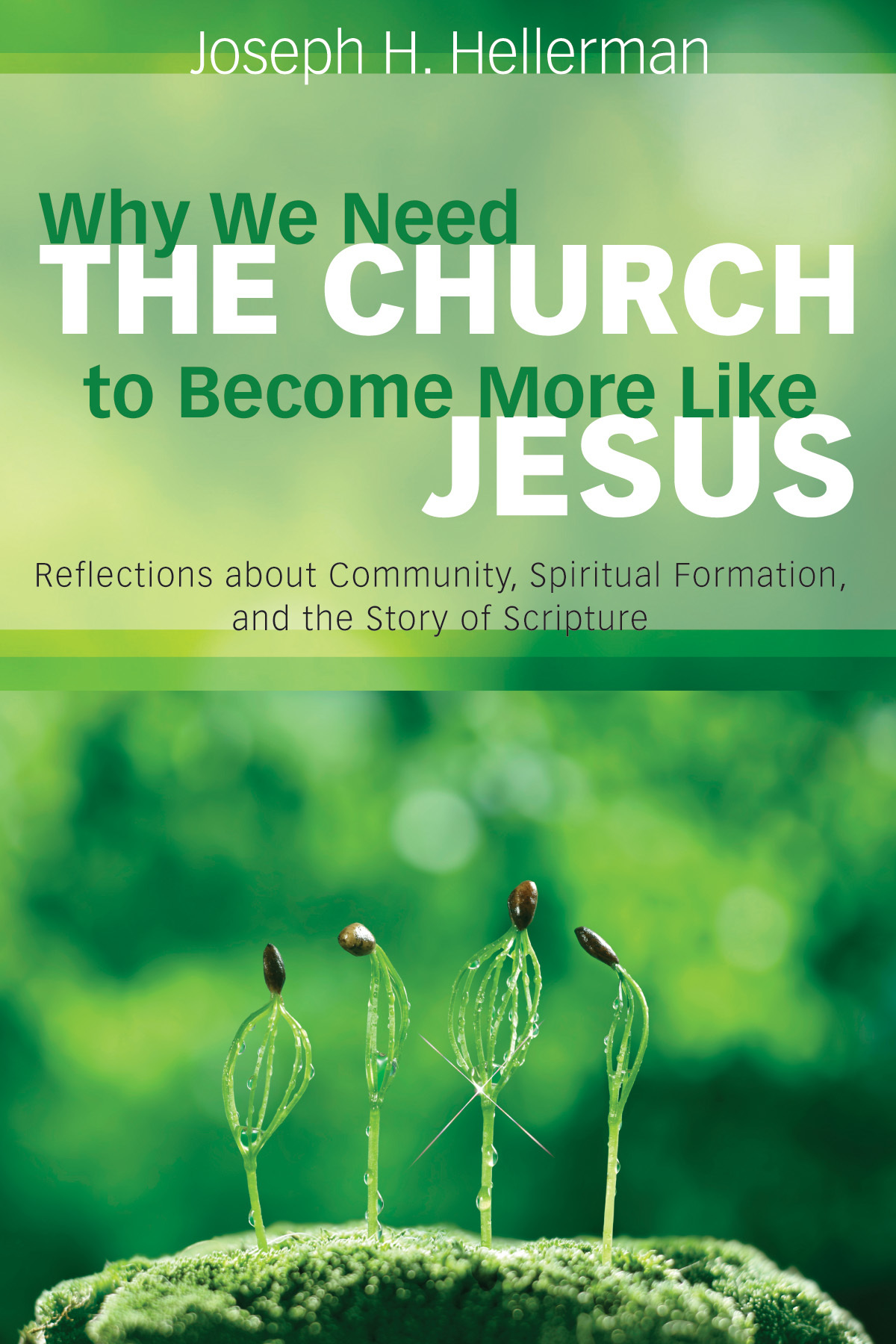Here is the Introduction from Dr. Joe Hellerman’s newly released book, Why We Need The Church To Become More Like Jesus: Reflections About Community, Spiritual Formation, & The Story Of Scripture:
“It is grace, nothing but grace, that we are allowed
to live in community with Christian brethren.”[1]
— Dietrich Bonhoeffer
Richard J. Foster planted the seeds for current interest in spiritual formation (SF) when he penned Celebration of Discipline, back in 1978.[2] The SF movement has since generated countless books and articles and has established itself as a familiar component of theological education in Christian colleges and seminaries across America.
As we might expect, SF has focused primarily on the spiritual development of the individual. Christian community has generally not been at the heart of the discussion.
Proponents have not ignored the church. Virtually every treatment of SF includes some observations about the ways in which relationships with others contribute to our growth in the Lord. It is fair to say, however, that community has not received the attention in the SF movement that it does, for example, in the Scriptures.
Foster’s seminal contribution is representative. Some fifty pages of Celebration of Discipline survey what Foster identifies as “The Corporate Disciplines”: “Confession,” “Worship,” “Guidance,” and “Celebration.” Well over 120 pages treat individual disciplines such as “Meditation,” “Prayer,” “Simplicity,” and “Solitude.”
Dallas Willard’s classic, The Spirit of the Disciplines, similarly emphasizes personal practices like “fasting,” “frugality,” and “sacrifice.” Willard gives significantly less attention to the communal aspects of the Christian life.[3]
To be fair, neither book was meant to serve as a full-blown treatise on spiritual formation. As the titles indicate, both Foster and Willard focused more narrowly on the spiritual disciplines of the Christian life. The two influential works established a trajectory for SF, however, which would leave its mark on the movement in the decades to follow.
Dietrich Bonhoeffer insightfully cautioned, “Let him who cannot be alone beware of community. Let him who is not in community beware of being alone.”[4] SF, particularly in the early years of the movement, addressed its message primarily to the former, that is, to those of us who need to learn how to be alone with God.[5]
The emphasis makes sense in view of our traditional theological taxonomies, which generally distinguish between sanctification and ecclesiology, and which situate the two topics at different places along the theological curriculum. I studied the subjects a year apart from one another, for example, in my M.Div. program at Talbot School of Theology back in the 1980s.
Taxonomies function as necessary and helpful ways to organize large amounts of material, and this is certainly the case for the discipline of theology. The threefold message that the above arrangement unfortunately communicates, however, is that (1) sanctification is about my individual development as a Christian, (2) ecclesiology is about the church and her mission, and (3) the latter is unrelated to the former. This has made it all too easy to overlook the central role the New Testament assigns to the church in the process of spiritual formation (today’s catchphrase for sanctification).
Recent treatments of spiritual life and growth have thankfully become more holistic and interdisciplinary, increasingly acknowledging the role of community in the sanctification process. The edgy title of James C. Wilhoit’s book forcefully underscored the need for this course correction: Spiritual Formation As If The Church Mattered.[6]
Discussions of the communal nature of sanctification are now commonplace in the literature. Near the beginning of Foundations of Spiritual Formation, a textbook for introductory courses in SF, for example, Paul Pettit emphasizes that “the change or transformation that occurs in the believer’s life happens best in the context of authentic, Christian community.”[7] Roman Catholic theologian Peter Feldmeier is even more categorical: “There is no such thing as ‘Jesus and me.’”[8]
This Book’s Contribution
Why We Need The Church To Become More Like Jesus joins what has now become an ongoing conversation about the role of the local church in the spiritual formation of the individual Christian. The book is hardly the last word on the issue. But I hope that the ideas presented in the chapters that follow will open several unexplored avenues for thinking about the relationship between sanctification and ecclesiology.
For better or for worse, my rather eclectic educational and ministerial background has equipped me to float some rather new and, perhaps, scandalous ideas (to American evangelicals) about the importance of community for faith development.
After a rigorous, traditional seminary education in theology and Greek and Hebrew exegesis, I spent the better part of nine years in a doctoral program in the History of Christianity at UCLA, where I was trained in social history and cultural analysis. My dissertation was published in 2001 as The Ancient Church as Family.[9] I have been researching and writing about early Christian community and social relations ever since.
I have also been a pastor of a local church for nearly forty years. The combination of real-life ministry experience and academic training has convinced me that we have departed in some profound ways from community as it was understood and practiced in the New Testament church. Until we get a handle on what the early church was actually like—until, that is, our ecclesiology is truly biblical—it seems to me that we are ill-equipped to talk about the role of the church in spiritual formation.
Why We Need The Church To Become More Like Jesus seeks to explore new territory along these lines. We will look at the early church in its ancient Mediterranean cultural setting. Then we will use what we discover about New Testament Christianity to engage in a rather pointed critique of spirituality and church life, as popularly understood among today’s evangelicals.
Much of what follows will be culturally and theologically challenging. I encourage you as a reader to approach the material with an open mind, an open heart, and an open Bible.
A final observation is in order before we move into the heart of the book. The approach will be intentionally one-sided. Western evangelicals focus primarily on me and God. The book you are about to read deals almost exclusively with us and God.
This is not because I think that cultivating a robust personal relationship with God is unimportant. Bonhoeffer is right. Each of us must learn how to be alone with God. I focus on the communal aspect of our faith for two reasons.
First, I feel no need to reiterate what we constantly hear in our churches and read in popular Christian literature. The evangelical community does not need yet another book telling me how to maximize my personal relationship with Jesus in the context of daily living.
More important is the issue of priorities. As we will discover, the New Testament emphasis is overwhelmingly upon the communal context of spiritual formation, namely, the local church and her mission. To genuinely experience God and grow as individuals, we must get on board with God’s program for his people as a whole. God’s presence and God’s power follow God’s priorities.
Many of us long to experience the fullness of God and his purpose for our lives. Not a whole lot of us ever do. The reason, as we will discover, is that we have departed in some significant ways from the biblical view of Christian life and growth.
In recent decades evangelicals have profoundly deemphasized the communal, missional, eschatological aspects of our walk with God in favor of experiencing God in the here-and-now. The time has come forcefully to swing the pendulum back in the biblical direction.
In the final, analysis, the whole argument of Why I Need The Church To Become More Like Jesus could be summed up in a single non-negotiable truth. We grow in our faith as individual Christians to the degree that we are deeply rooted relationally in a local church community that is passionately playing its part in God’s grand story of Creation, Fall, Redemption, and Restoration.
[1]Bonhoeffer, Life Together, 20.
[2]Foster, Celebration of Discipline.
[3]Willard, The Spirit of the Disciplines.
[4]Bonhoeffer, Life Together, 78.
[5]Thus, Boa only considers “Corporate Spirituality” in the final section (out of twelve) of his widely read textbook, Conformed To His Image, 415-449.
[6]Wilhoit, Spiritual Formation As If The Church Mattered.
[7]Pettit, “Introduction,” 19, author’s italics. See also Whitney, Spiritual Disciplines Within the Church, and, for the practice of spiritual direction, Reed, Quest for Spiritual Community.
[8]Feldmeier, The Developing Christian, 29.
[9]Hellerman, The Ancient Church As Family.
 Biola University
Biola University



.jpg)
.jpg)